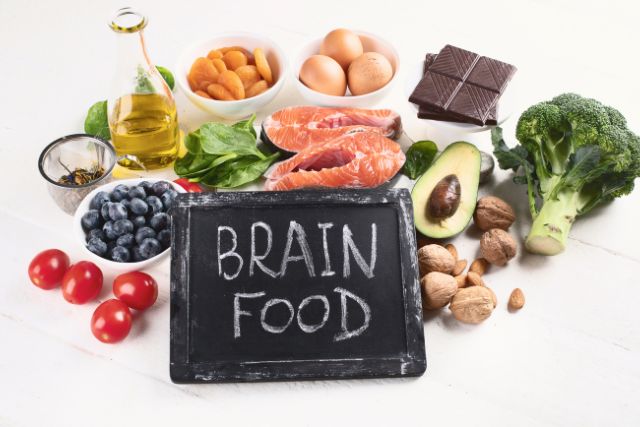Recent Posts
-

- Diabetes-Friendly Nutrition: Smart... 08.12.2024
-

- Nutrition for Chronic... 08.12.2024
-

- Anti-Inflammatory Diet: Food... 08.12.2024
-

- Low-Sodium and Heart-Healthy:... 08.12.2024
-

- Plant-Based Diets for... 08.12.2024
The Connection Between Nutrition and Cognitive Performance: Top Brain Foods

Maintaining optimal cognitive performance is more important than it has ever been due to the fast-paced nature of today's environment. Although numerous aspects contribute to brain health, diet is one of the most important factors. Our memory, our ability to concentrate, and our general mental acuity may all be dramatically influenced by the things that we eat. The relationship between diet and cognitive function is investigated in this article, which also sheds light on the best meals for the brain that have the potential to improve our mental capacities.
Comprehending the Relationship Between the Brain and Nutrition
In spite of the fact that it only accounts for around 2% of our total body weight, the brain demands approximately 20% of our daily calorie intake. To operate at its full potential, it must be provided with a steady supply of both energy and nutrients. A number of nutrients are very crucial for maintaining healthy brain function:
Omega-3 Fatty Acids are a kind of fat that the body cannot create on its own and are, therefore, considered important. They play a significant role in the development of brain and nerve cells, as well as in the processes of learning and memory.
Antioxidants: These can protect the brain from the damaging effects of oxidative stress, which can impair cognitive function and cause damage to brain cells.
Minerals and Vitamins: Folic acid, vitamin B6, and vitamin B12 also play an important role in maintaining healthy brain function. In addition, minerals such as magnesium, zinc, and iron all play important roles in the proper functioning of the brain.
Top Brain Foods to Boost Cognitive Performance
Fatty Fish
Omega-3 fatty acids may be found in abundance in fatty fish, such as salmon, trout, and sardines of the group. With their ability to construct membranes surrounding brain cells and improve the structure of neurons, these fats are necessary for maintaining a healthy brain. According to a number of studies, individuals who have greater amounts of omega-3 fatty acids have improved cognitive abilities and increased blood flow to the brain.
Blueberries
Anthocyanins, which are responsible for the anti-inflammatory and antioxidant properties of blueberries, are among the most abundant antioxidants found in blueberries. These substances can slow down the aging process of the brain and increase memory. There is a correlation between the eating of blueberries on a regular basis with slower rates of cognitive deterioration.
Turmeric
Curcumin, which is found in turmeric, is a molecule that can pass across the blood-brain barrier and possesses considerable anti-inflammatory and antioxidant properties. Research has demonstrated that curcumin can enhance memory, alleviate symptoms of depression, and stimulate the creation of new brain cells.
Broccoli
Broccoli is an abundant source of antioxidants and vitamin K, both of which are essential for the formation of sphingolipids, a kind of fat that is located in tightly packed concentrations within brain cells. In addition, it possesses antioxidant and anti-inflammatory properties, both of which are beneficial to the brain.
Pumpkin Seeds
Pumpkin seeds are a rich source of magnesium, iron, zinc, and copper. They also contain antioxidants and are a good source of magnesium. Copper is essential for maintaining healthy nerves, magnesium is necessary for learning and memory, zinc is necessary for nerve transmission, and iron is necessary for avoiding cognitive decline. Each of these minerals is essential for brain health.
Oranges
Vitamin C, a potent antioxidant, may be found in abundance in citrus fruits like oranges and other citrus fruits. Vitamin C has been shown to protect against cognitive loss associated with aging and to enhance brain health as we age.
Nuts
Walnuts, in particular, are an excellent source of omega-3 fatty acids, antioxidants, and vitamin E within the food chain. Consuming these nutrients has been linked to enhanced cognitive function and a reduced likelihood of experiencing cognitive decline.
Eggs
Several nutrients that are associated with brain function may be found in eggs, including vitamins B6 and B12, folate, and choline. Eggs are a rich source of these nutrients. In order to produce acetylcholine, a neurotransmitter that plays a role in the regulation of mood and memory, choline is an essential component.
Green Tea
Caffeine and L-theanine, both of which are found in green tea, have been shown to improve brain function. In contrast to L-theanine, which promotes relaxation without causing sleepiness, caffeine is known to boost alertness. Additionally, green tea contains antioxidants that are beneficial to the brain.
The consumption of certain meals that are beneficial to the brain can have a substantial impact on the cognitive function of an individual. We can make educated decisions about our diets that will improve our mental function and protect us from cognitive decline if we have a thorough awareness of the significant role that nutrition plays in maintaining brain health. Keep in mind that a well-balanced diet that is abundant in essential nutrients, in conjunction with other healthy lifestyle behaviors, may contribute to increased brain health as well as general well-being.
Disclaimer: The information provided in this article is for general information purposes only. All information in this article is sourced from other websites, and we do not represent any rights regarding the contents and information on the site. All rights belong to their original owner.





